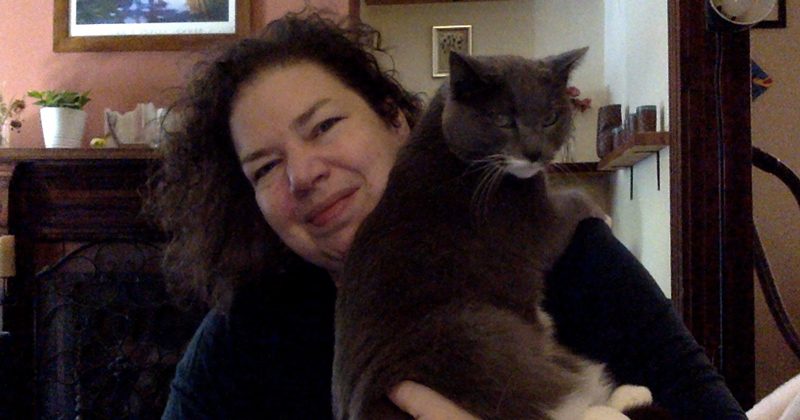


Cats on a box
Photo courtesy of Dawn Fallik January 11, 2022
The story behind the viral story
The editor of InStyle has called it the GOAT of cat stories. Author Neil Gaiman liked it. And if you’re among the 800,000 to have already viewed the top-read Washington Post story, you’ve likely already met Max, George and Lando Calrissian, the three Vancouver cats who have held a Vitamix box hostage.
Perhaps lesser known is that this viral piece was written by UD journalism Prof. Dawn Fallik, who specializes in medical stories, with a particular focus on data analysis.
A freelance journalist, Fallik’s previous record was a Wall Street Journal article on the "Iron Chef" battle with Michelle Obama, which received 300 comments (compared to the cats’ 4,000-plus).
Clearly, her latest story resonated. UD’s very own cat woman shared her thoughts on why that happened, how the story came to be and the dorky love of strangers that has been a source of pure 2022 joy.
Q: Why did the story click with so many?
Fallik: Cat people read that story and were like, “YES, these are my people.” Those with cats know they are the boss of us. Dogs are generally happy beings. Cat default is displeased disdain. Our mission is to try and make them happy. It's like making a baby laugh, people will make fools of themselves to make that happen. Worth it, right? With cats, sometimes it's a simple thing like tuna or a piece of string, or having dinner elsewhere because the cat is sleeping on a kitchen chair. And sometimes it's a huge inconvenience or expense, like leaving a $500 blender in a box in the middle of your kitchen for a month because it's your cats’ new favorite place. If you know, you know.
Q: What does a story like this say about the viral nature of news?
Fallik: The stories that go viral tend to fall into two categories: quirky/funny or deeply vulnerable. Look at Humans of New York. These are short stories about everyday people and their joys and challenges. They are short, simple and in the person’s own words. Millions connect to these strangers. We don’t know them, but we relate, we see ourselves or people we know. If a story makes us laugh or cry, or feel a connection, we’re likely to send it to others. Because then they laugh or cry, and you get to enjoy it through them.
Q: How did you find this story?
Fallik: I found it while procrastinating on Facebook instead of writing a controversial medical story [about people not wanting to get weighed at the doctor’s office — an important topic which can be especially sensitive to readers. The article should come out in the Post next week]. I saw the couple's public post to Vitamix asking for extra boxes and it made me laugh, and I immediately wanted to tell all my cat friends. As a reporter, that's usually the sign of a good story.
Q: What do you love most about this story?
Fallik: The comments. There are more than 4,500 of them, and overwhelmingly they are joyous. (There are some haters without a soul or sense of whimsy.) People wrote about getting king-size beds so there was room for their dogs, or moving furniture so cats could sit in the sunbeam. The comments on stories can be vicious and personal. And yet, this time, it was thousands and thousands of people shamelessly sharing their dorky love. I'm here for that.
Q: Are there any comments that have surprised you?
Fallik: I've gotten a lot of comments from people not in the journalism industry saying something like, “This story is going everywhere, you are going to rake it in!” That is not how professional journalists get paid. I got a flat fee that’s agreed upon when you set the length and deadline. Clicks and page views are meaningless when it comes to payment — and that's true for my stories for NPR or The Wall Street Journal or anywhere I've ever written. That's a huge misconception when people talk about “the media.”
Q: Any takeaway from this experience, either personally or professionally?
Fallik: Writing funny is difficult although I've been told I'm fabulous at yelling in email. Tone in print doesn't always come through.. as anyone who has ever misinterpreted a text will know. Medicine, crime, politics — those stories are usually straight-forward, although the material itself can be complicated. The trick is to let the story tell itself. There was just one line that was purely my snark, and I got quite a few comments from students and friends saying "I could SO hear you saying this." That was, "People frequently ask why the couple doesn’t just take the cats off the box. These are clearly dog owners. This is not how cats work."
Q: Have you always been a cat lover?
Fallik: I've had cats in my life since I was very little (and one sheepdog). Little did I know that they were just training me so I'd have the skills to write this story. Now I've got to go because I have one elderly cat with no teeth who only eats baby food (Gerber turkey in the glass jar), and I'm almost out.
Contact Us
Have a UDaily story idea?
Contact us at ocm@udel.edu
Members of the press
Contact us at 302-831-NEWS or visit the Media Relations website

